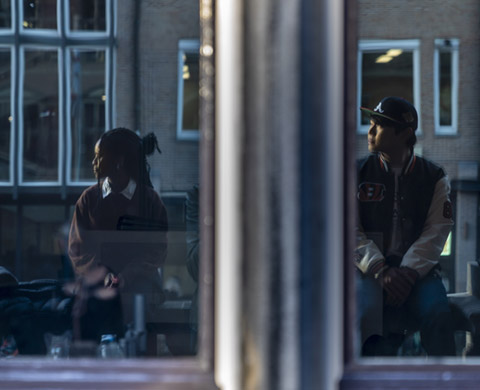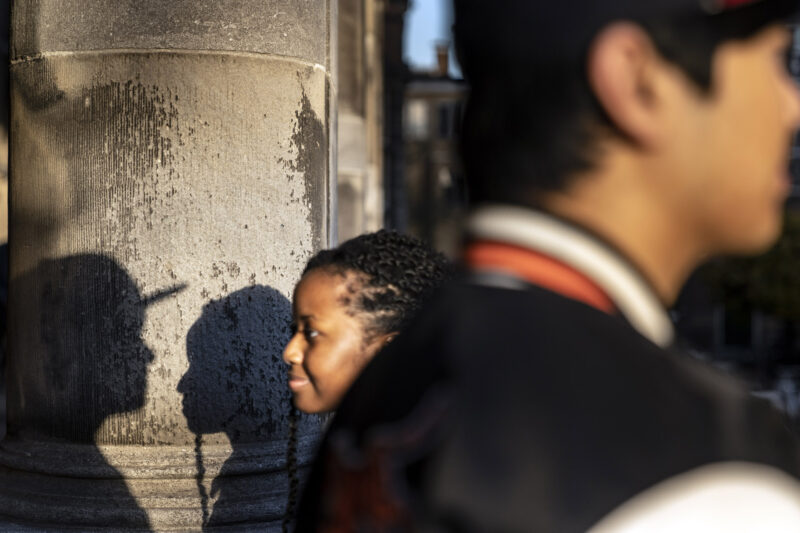
Wendy, Mercy, Lucille and MJ
When your name is not really your name
Chinese student Wenting Zhao knows the story that’s going around campus. It was about a fellow Chinese student with an outlandish name – for Westerners, at least. The student had tried to tell her professor several times what it was. However, he had real trouble pronouncing it, or even remembering it correctly. So after a few tries, he just pointed whenever he wanted something from her, or called her ‘Chinese’.
‘It may not have happened to me’, Wenting says, ‘but when I heard it, I felt quite uncomfortable. It’s very racist and derogatory of course, but I don’t want to be in a situation like that. So when anyone asks me my name, I just use my English name since it’s easy and people can remember it.’
And so the master student of arts, policy and cultural entrepreneurship Wenting Zhao is known by the European community as ‘Wendy’.
Not a simple question
‘What is your name?’ seems like such a simple question, but for many international students – especially those from Asia or Africa – it really is not. Most have names that Europeans find hard to pronounce – just like Wenting – and they feel it’s easier to opt for a Western one.
So when anyone asks me my name, I just use my English name since it’s easy
And so clinical linguistics master student Oluwaseyi Agebeye from Nigeria goes by ‘Mercy’. UCG student Minjae Kim goes by ‘MJ’, turning his name into an acronym of sorts. And economics student Lucille ‘Mumbi’ Kibara – who has both a Kenyan name and a foreign name – mostly introduces herself as Lucille.
It wasn’t a hard choice to decide which name she would choose, Wenting says. ‘It was a nickname given to me by my friends and people already called me this in China. It happens a lot in Chinese culture. Even my mother calls me WenWen. I’m only Wenting when she’s mad at me.’
In Nigeria it is common to have an English name along with an ethnic name and so, both names really ‘belong’ to Oluwaseyi. ‘Mercy also represents an important value to me’, she says.
UCG student Minjae Kim took the easy way and just went with his initials. ‘It takes people a while to pronounce my name correctly. Some eventually get it, but some never do’, he says.

Important reason
Pronunciation is an important reason for students to change their given names. Mercy Oluwaseyi sees how people sometimes struggle. ‘And to be honest, I’d rather people avoid my name completely if it’s too difficult to pronounce’, she says.
If others pronounce your name in the wrong way they give it another meaning
In some cases mispronunciation itself isn’t even the biggest problem, but the changes it causes to the meaning of the name. ‘In Chinese, if there is a change in tune or tone, it renders the name totally different, like in the case of Zhao to Cao. If others pronounce your name in the wrong way, they give it another meaning that is not nice’, says Wenting.
Wenting makes it clear, she doesn’t use Wendy to fit in. ‘It’s just easier — for me and for others.’
But there are other reasons, too. Minjae is quite aware that his name is ‘different’. Going by MJ solves that problem. Lucille Mumbi also experiences how not-Western her given name really is. ‘When I use Mumbi, there is always a lot of curiosity in what it means and its origins’, she says.
‘In most cases, it is genuine curiosity, but still I feel like an animal in a zoo.’ This is a regular occurrence where internationals feel exoticised for their names.
Stereotyping
And then there is the fact that a non-Western name might give rise to stereotyping and racial bias, which is a struggle many foreigners face. ‘But Lucille is a name predominantly used by white women’, she says. ‘So, when applying for jobs I use Lucille. Mumbi just makes me sound too “ethnic”.’
However, even though using Western names makes life a little easier for these students, changing their names makes them lose something, too.
Minjae and Wenting don’t mind as much. ‘I actually prefer Wendy because we go by nicknames in China often. I think the name is just like a code, a number. I’m still me. I’m still Chinese; it doesn’t really matter.’
I feel using my initials is a way to give people options
Minjae prefers his full name, but also doesn’t feel too connected to his South Korean heritage and considers himself a TCK (Third Culture Kid), growing up with multiple cultural influences. ‘I feel using my initials is a way to give people options. It’s fine!’
Wenting does know many students who do care, though. ‘It represents their nationalities or something they don’t want to change.’
Identity
This is something Mumbi can attest to. ‘Going by Lucille feels like a colonisation of my identity’, she says. Her Kenyan name has great significance to her, as she shares it with her grandmother. The name connects her to her family and roots. ‘Whenever I choose to introduce myself with an English name, it feels like I’m moving further away from associating with my tribe and culture.’
However, the time is not quite right to solely go by her ethnic names. Unless – of course – when she decides to leave Europe for Kenya. ‘Maybe later’, she says. ‘When I feel comfortable and have established my career in Europe, then I would love to stick to my ethnic name more.’